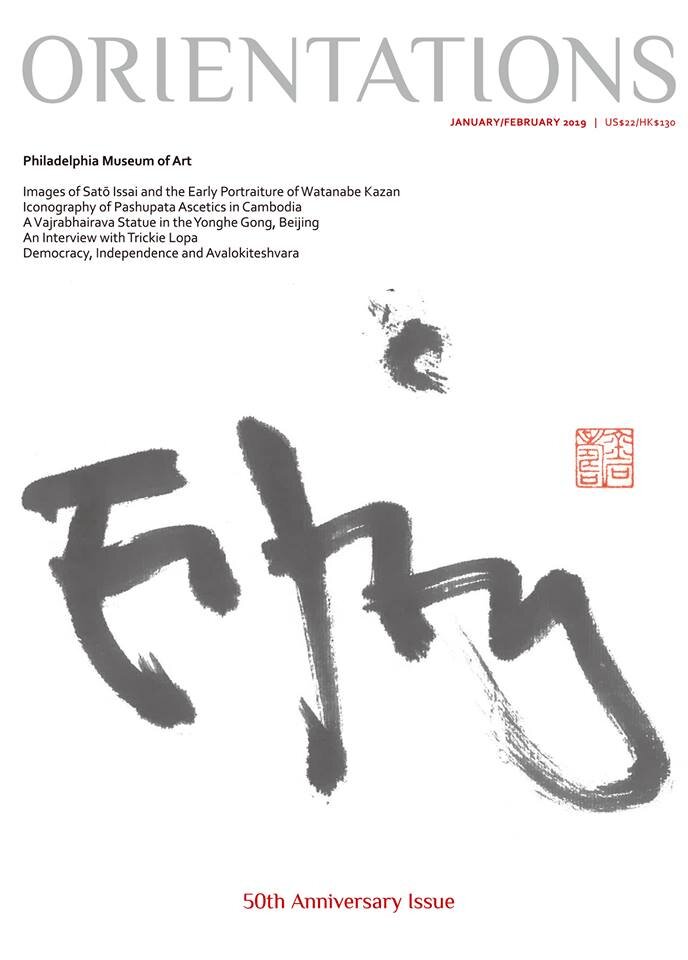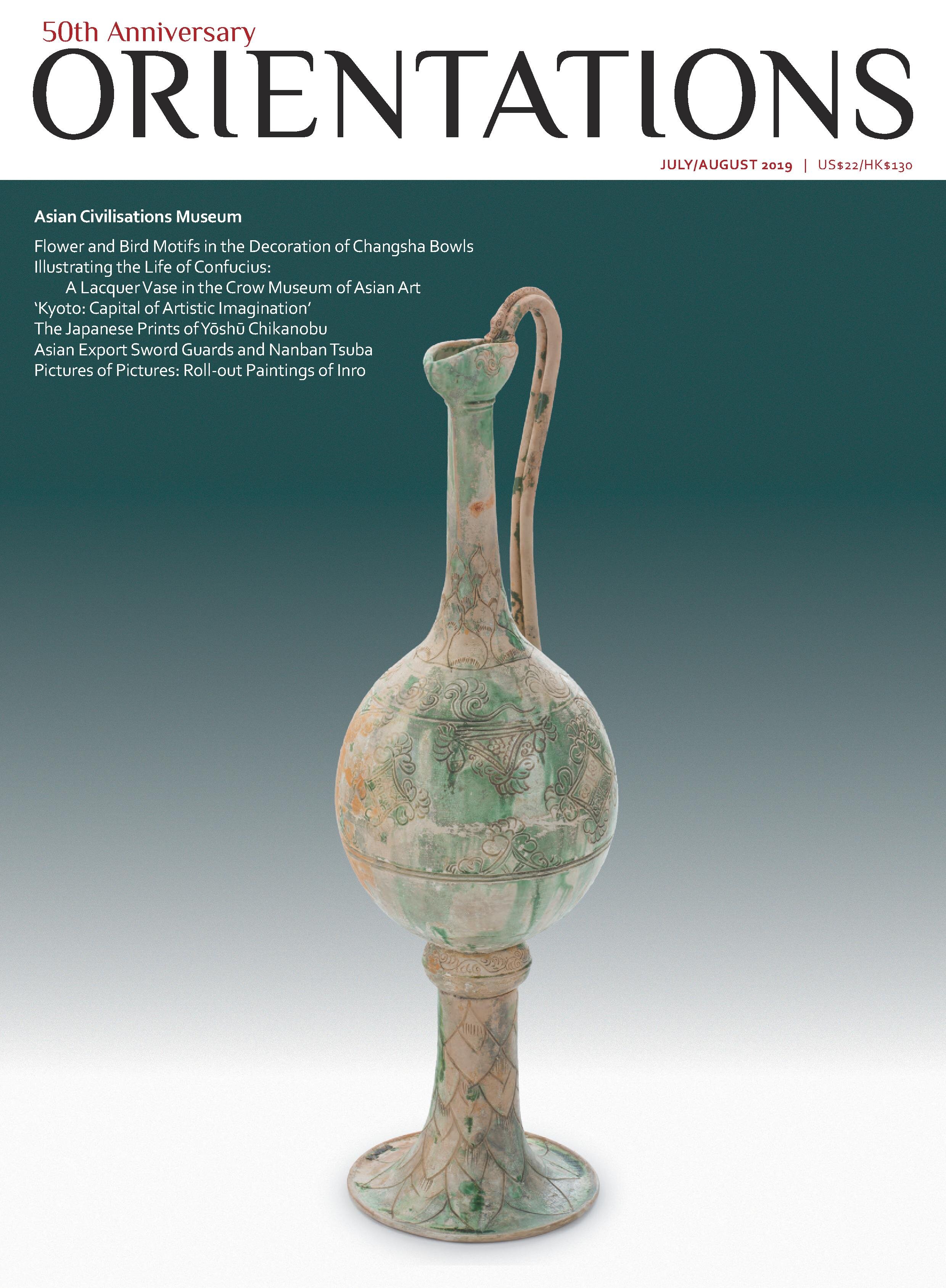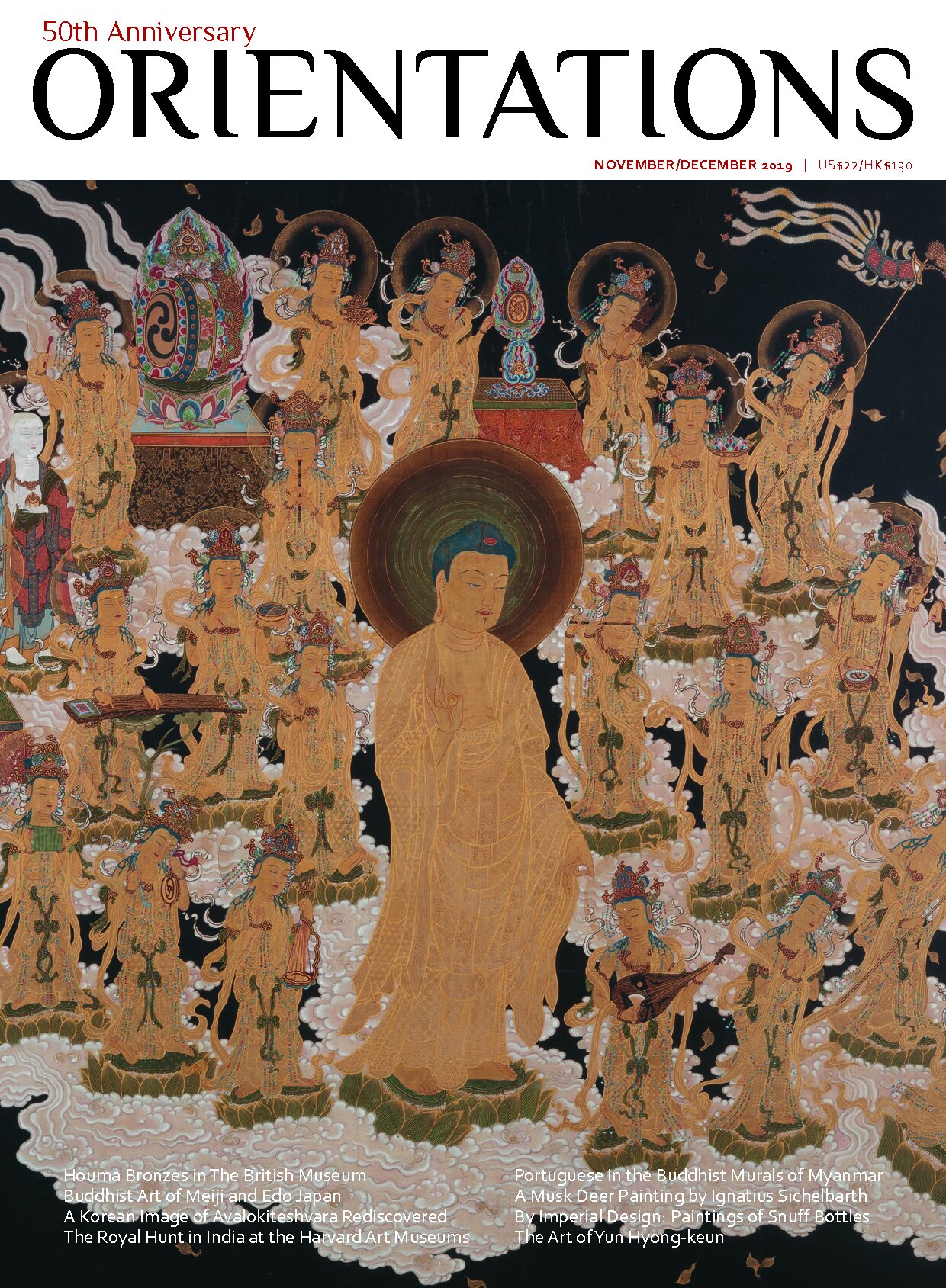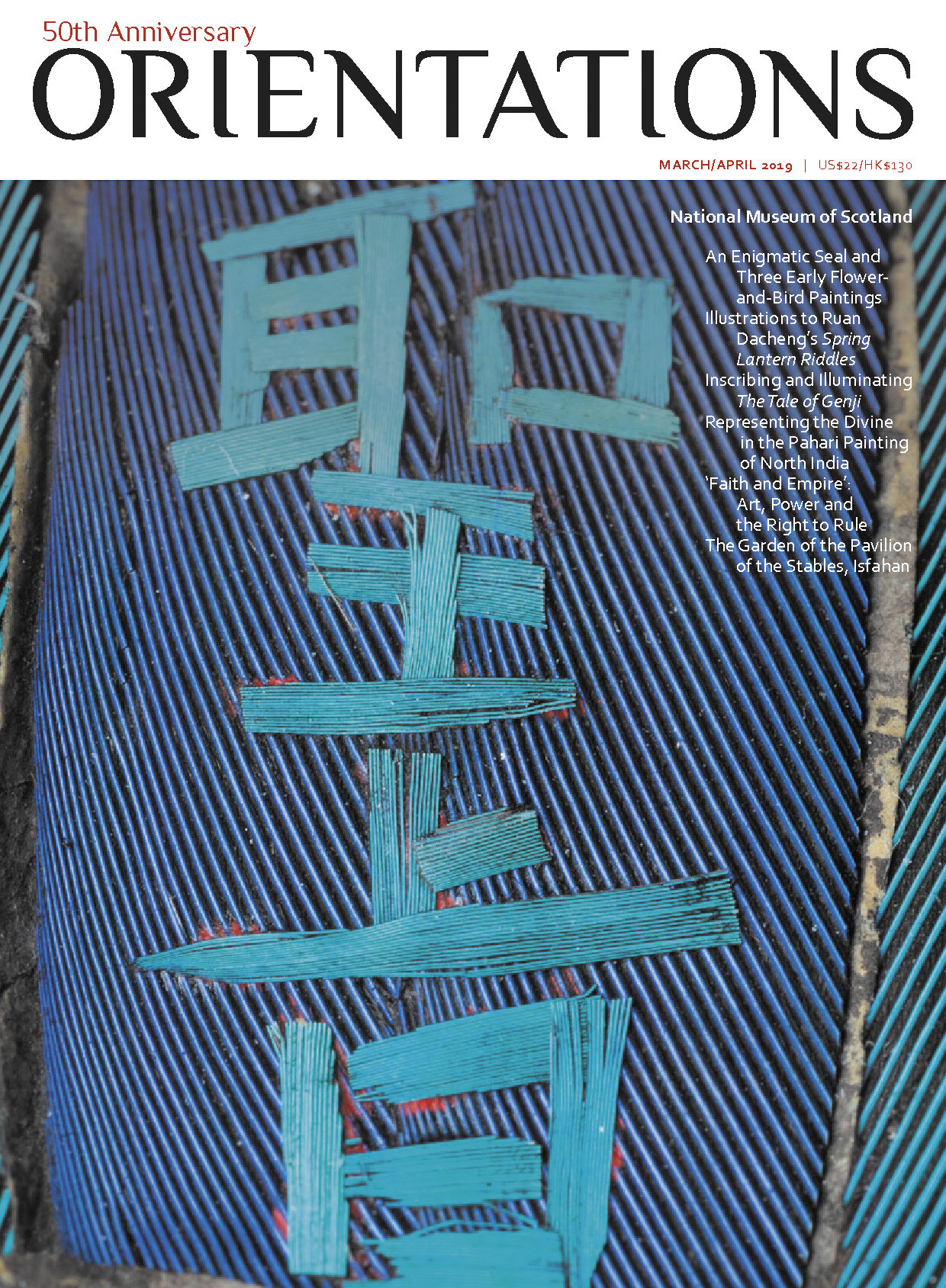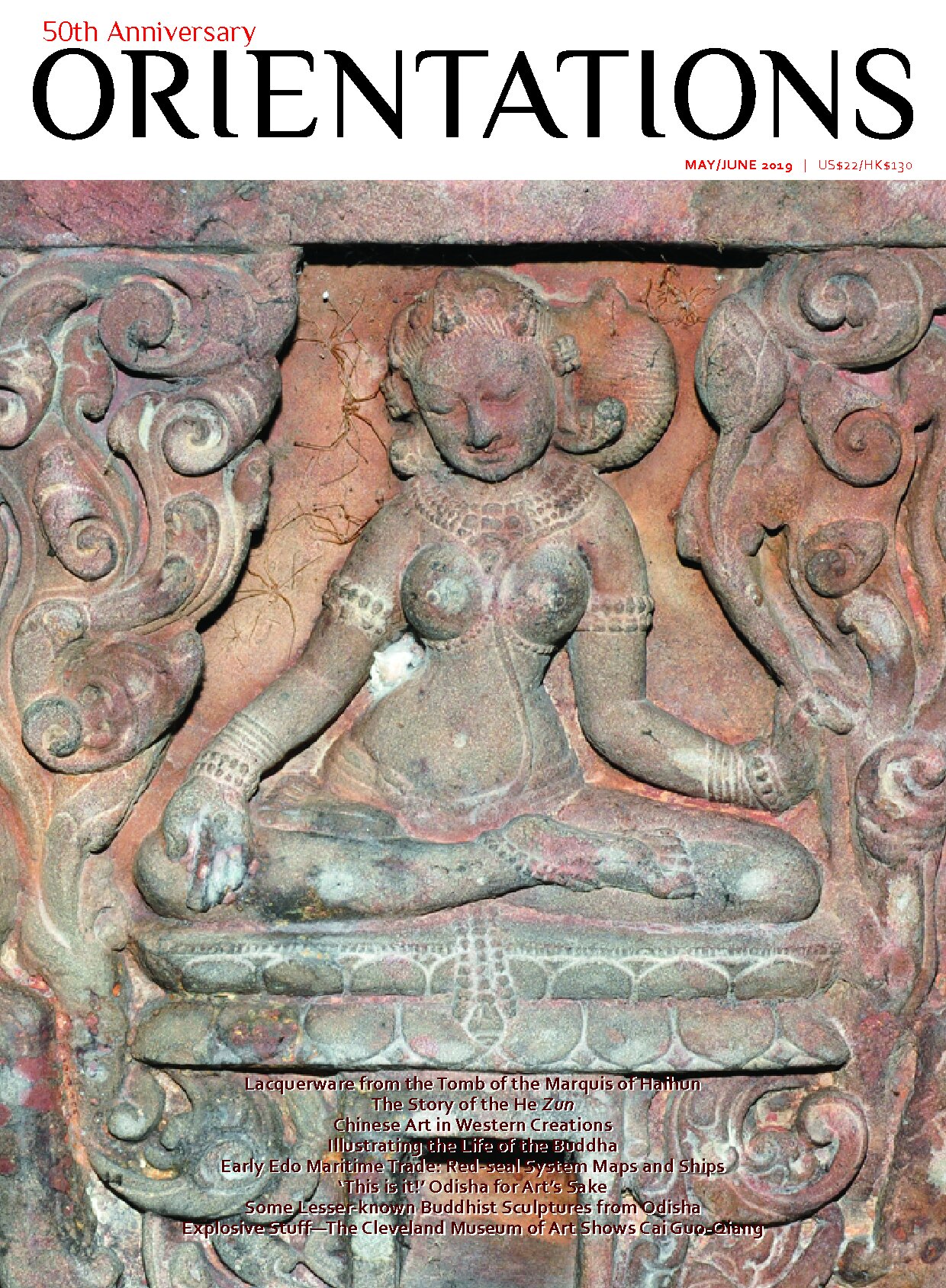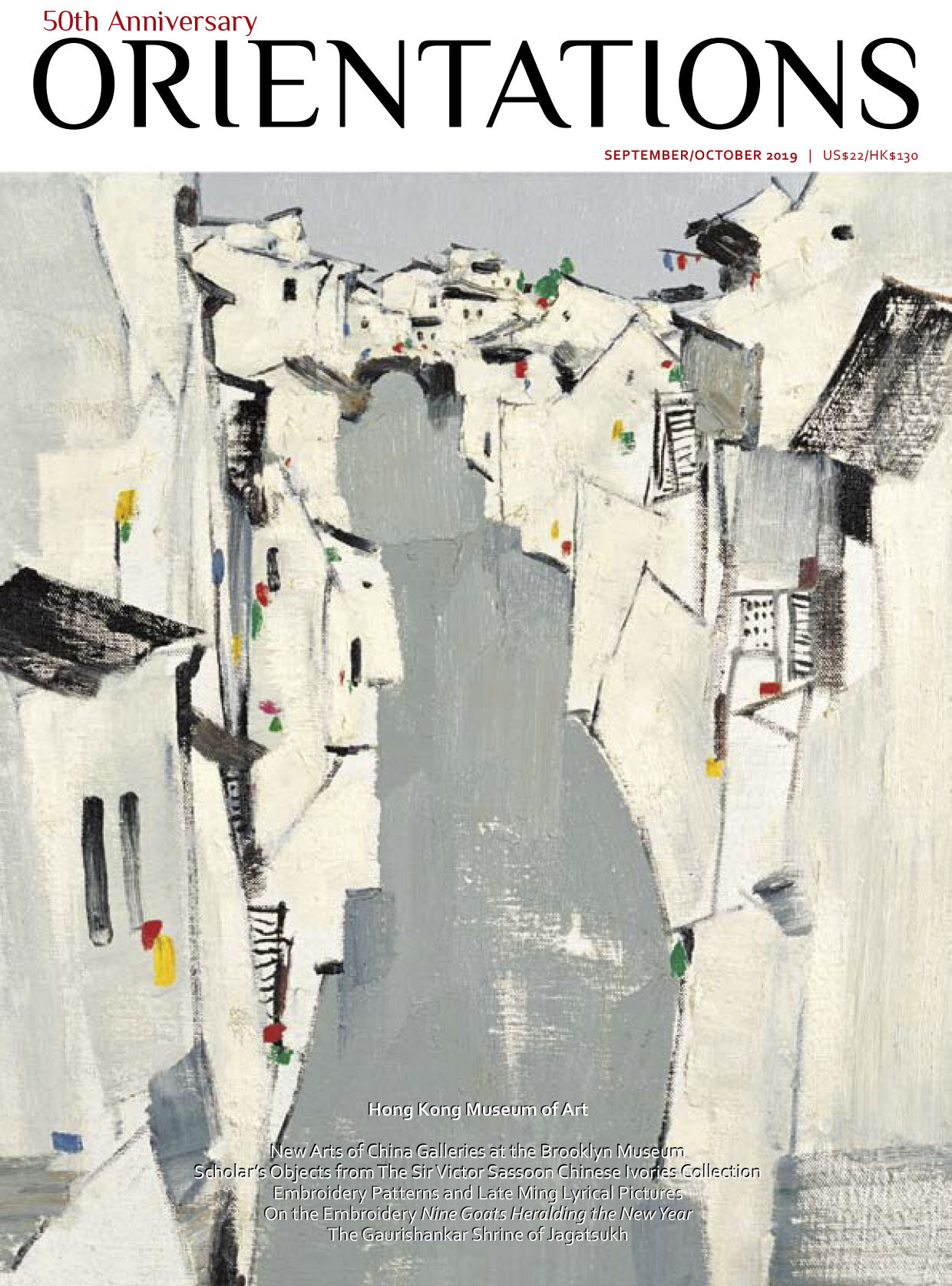JAN/FEB 2019
VOLUME 50 - NUMBER 1
This year, Orientations is proud to celebrate fifty years in publication. We intended the content of this first issue of 2019 to be representative of the magazine as it is today, with material ranging from China to Korea, Japan, Cambodia, India, the Philippines and Mongolia, and a similar diversity of authorship. We also launch a new series, ‘Asian Art in Design’, which, together with our ongoing series ‘Art in Context’, aims to showcase an engagement with art.
Following memos by the magazine’s current publisher Yifawn Lee and founder Adrian Zecha, an interview with former publisher/editorial director Elizabeth Knight and a selection of covers from the past fifty years, we kick off the main body of the issue with three articles relating to the Philadelphia Museum of Art, which will open its permanent Chinese art galleries in early February following a comprehensive renovation and reinstallation. Hiromi Kinoshita discusses highlights among the Chinese collection’s over 7,000 works and the rationale behind the installation, while Diandian Li focuses on one of the first Chinese paintings acquired by the museum, in 1925. Hyunsoo Woo looks at the dating of a Korean peony screen purchased in 2009, unusual due to its combination of Korean-style court painting and the use of US newspapers as backing.
Next, former Orientations associate editor and independent scholar Carol Morland examines images of the Japanese neo-Confucian scholar and teacher Satō Issai in light of the re-emergence of a portrait in Seattle; Shivani Kapoor argues that the representation of ascetics in Cambodian iconography relates to the Shaivite Pashupata sect; and David Weldon redates an image of Vajrabhairava in the monastery Yonghe gong in Beijing.
For ‘Asian Art in Design’, we interview Trickie Lopa, founder of the Philippines art fair Art In The Park, about her contemporary art collection and how she displays it in her home; for ‘Curator’s Choice’, Jane Portal reveals how her first encounter with Chinese art influenced her life; and for ‘Art in Context’, Lhagvademchig Jadamba Shastri tells the story of an Avalokiteshvara statue in Ulaanbaatar, a symbol of Mongolian democracy and independence.
FEATURES
Hiromi Kinoshita. Reimagining the Chinese Galleries at the Philadelphia Museum of Art
Diandian Li. Beauty Reviewed: Mangguri and Portraiture for the Yongzheng Court
Hyunsoo Woo. Unfolding Stories: A Korean Peony Screen at the Philadelphia Museum of Art
Carol Morland. Images of Sato Issai and the Early Portraiture of Watanabe Kazan
Shivani Kapoor. Iconography of Pashupata Ascetics in Cambodia
David Weldon. A Vajrabhairava Statue in the Yonghe Gong, Beijing
Lhagvademchig Jadamba Shastri. Democracy, Independence and Avalokiteshvara—the Wisdom Eye-Opener
PREVIEWS & REVIEWS
Florian Knothe. Book Review: Essential Terms of Chinese Painting
INTERVIEWS
An Interview with Trickie Lopa
An interview with Elizabeth Knight
NEWS
Joel Frankel (1937 - 2018)
COMMENTARY
Jane Portal. The Power of Art
VOLUME 50 - NUMBER 1
This year, Orientations is proud to celebrate fifty years in publication. We intended the content of this first issue of 2019 to be representative of the magazine as it is today, with material ranging from China to Korea, Japan, Cambodia, India, the Philippines and Mongolia, and a similar diversity of authorship. We also launch a new series, ‘Asian Art in Design’, which, together with our ongoing series ‘Art in Context’, aims to showcase an engagement with art.
Following memos by the magazine’s current publisher Yifawn Lee and founder Adrian Zecha, an interview with former publisher/editorial director Elizabeth Knight and a selection of covers from the past fifty years, we kick off the main body of the issue with three articles relating to the Philadelphia Museum of Art, which will open its permanent Chinese art galleries in early February following a comprehensive renovation and reinstallation. Hiromi Kinoshita discusses highlights among the Chinese collection’s over 7,000 works and the rationale behind the installation, while Diandian Li focuses on one of the first Chinese paintings acquired by the museum, in 1925. Hyunsoo Woo looks at the dating of a Korean peony screen purchased in 2009, unusual due to its combination of Korean-style court painting and the use of US newspapers as backing.
Next, former Orientations associate editor and independent scholar Carol Morland examines images of the Japanese neo-Confucian scholar and teacher Satō Issai in light of the re-emergence of a portrait in Seattle; Shivani Kapoor argues that the representation of ascetics in Cambodian iconography relates to the Shaivite Pashupata sect; and David Weldon redates an image of Vajrabhairava in the monastery Yonghe gong in Beijing.
For ‘Asian Art in Design’, we interview Trickie Lopa, founder of the Philippines art fair Art In The Park, about her contemporary art collection and how she displays it in her home; for ‘Curator’s Choice’, Jane Portal reveals how her first encounter with Chinese art influenced her life; and for ‘Art in Context’, Lhagvademchig Jadamba Shastri tells the story of an Avalokiteshvara statue in Ulaanbaatar, a symbol of Mongolian democracy and independence.
FEATURES
Hiromi Kinoshita. Reimagining the Chinese Galleries at the Philadelphia Museum of Art
Diandian Li. Beauty Reviewed: Mangguri and Portraiture for the Yongzheng Court
Hyunsoo Woo. Unfolding Stories: A Korean Peony Screen at the Philadelphia Museum of Art
Carol Morland. Images of Sato Issai and the Early Portraiture of Watanabe Kazan
Shivani Kapoor. Iconography of Pashupata Ascetics in Cambodia
David Weldon. A Vajrabhairava Statue in the Yonghe Gong, Beijing
Lhagvademchig Jadamba Shastri. Democracy, Independence and Avalokiteshvara—the Wisdom Eye-Opener
PREVIEWS & REVIEWS
Florian Knothe. Book Review: Essential Terms of Chinese Painting
INTERVIEWS
An Interview with Trickie Lopa
An interview with Elizabeth Knight
NEWS
Joel Frankel (1937 - 2018)
COMMENTARY
Jane Portal. The Power of Art
VOLUME 50 - NUMBER 1
This year, Orientations is proud to celebrate fifty years in publication. We intended the content of this first issue of 2019 to be representative of the magazine as it is today, with material ranging from China to Korea, Japan, Cambodia, India, the Philippines and Mongolia, and a similar diversity of authorship. We also launch a new series, ‘Asian Art in Design’, which, together with our ongoing series ‘Art in Context’, aims to showcase an engagement with art.
Following memos by the magazine’s current publisher Yifawn Lee and founder Adrian Zecha, an interview with former publisher/editorial director Elizabeth Knight and a selection of covers from the past fifty years, we kick off the main body of the issue with three articles relating to the Philadelphia Museum of Art, which will open its permanent Chinese art galleries in early February following a comprehensive renovation and reinstallation. Hiromi Kinoshita discusses highlights among the Chinese collection’s over 7,000 works and the rationale behind the installation, while Diandian Li focuses on one of the first Chinese paintings acquired by the museum, in 1925. Hyunsoo Woo looks at the dating of a Korean peony screen purchased in 2009, unusual due to its combination of Korean-style court painting and the use of US newspapers as backing.
Next, former Orientations associate editor and independent scholar Carol Morland examines images of the Japanese neo-Confucian scholar and teacher Satō Issai in light of the re-emergence of a portrait in Seattle; Shivani Kapoor argues that the representation of ascetics in Cambodian iconography relates to the Shaivite Pashupata sect; and David Weldon redates an image of Vajrabhairava in the monastery Yonghe gong in Beijing.
For ‘Asian Art in Design’, we interview Trickie Lopa, founder of the Philippines art fair Art In The Park, about her contemporary art collection and how she displays it in her home; for ‘Curator’s Choice’, Jane Portal reveals how her first encounter with Chinese art influenced her life; and for ‘Art in Context’, Lhagvademchig Jadamba Shastri tells the story of an Avalokiteshvara statue in Ulaanbaatar, a symbol of Mongolian democracy and independence.
FEATURES
Hiromi Kinoshita. Reimagining the Chinese Galleries at the Philadelphia Museum of Art
Diandian Li. Beauty Reviewed: Mangguri and Portraiture for the Yongzheng Court
Hyunsoo Woo. Unfolding Stories: A Korean Peony Screen at the Philadelphia Museum of Art
Carol Morland. Images of Sato Issai and the Early Portraiture of Watanabe Kazan
Shivani Kapoor. Iconography of Pashupata Ascetics in Cambodia
David Weldon. A Vajrabhairava Statue in the Yonghe Gong, Beijing
Lhagvademchig Jadamba Shastri. Democracy, Independence and Avalokiteshvara—the Wisdom Eye-Opener
PREVIEWS & REVIEWS
Florian Knothe. Book Review: Essential Terms of Chinese Painting
INTERVIEWS
An Interview with Trickie Lopa
An interview with Elizabeth Knight
NEWS
Joel Frankel (1937 - 2018)
COMMENTARY
Jane Portal. The Power of Art

